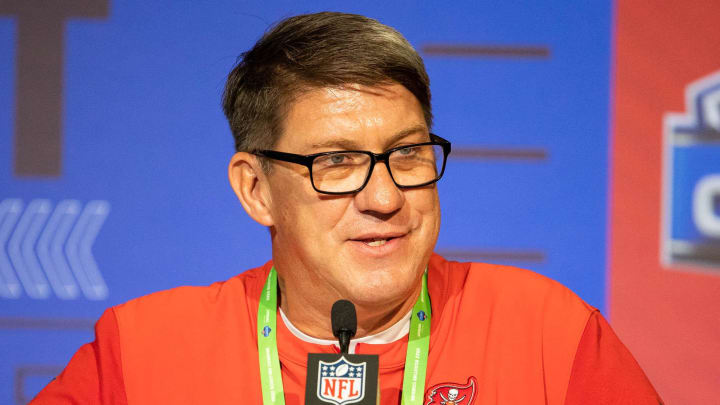Tampa Bay Buccaneers General Manager Jason Licht Talks Navigating The Salary Cap

Fielding a team that can compete in the NFL is no easy task. To make it easier on themselves, teams go out of their way to sign star players to massive deals in the hopes that game-changing plays can make a difference. However, that comes with a caveat. The more money you spend on big-name players, the less money you will have to even out across the rest of the roster — likely resulting in holes on your team.
The onus on keeping track of the team's salary cap doesn't always solely fall upon the organization's general manager. In fact, there are several people involved in the process of making sure the franchise's finances are tucked away nicely and spent well. For the Buccaneers, general manager Jason Licht relies upon his assistant GM Mike Greenberg, as evidenced by his comments with ESPN.
READ MORE: Buccaneers Head Coach Todd Bowles Can't Wait To See Rookie WR In Pads
"When I moved up into this job, there were definitely conversations where I'd say, 'Why don't we just stick some of that money into the third year?'" Licht said. "And Mike would have to explain, 'Well, we can't do that because of what happens to this other deal that year.'"
Clearly, figuring out the salary cap isn't as easy as putting numbers to paper and making it work within a single given year or season. Leaning on a group or other specialist while working out the salary cap will only be beneficial for teams that are trying push the limits.
Speaking of limits, the NFL salary cap is always fluctuating, albeit it tends to go up from year to year, but some factors can cause the cap to drop or fall out depending on the circumstances. For instance, the Buccaneers have recently been in salary cap hell over the past few years, largely due to going all-in during the Tom Brady years but also because of the unforeseen circumstances that encapsulated the COVID-19 pandemic.
After the pandemic, the salary cap dropped a whopping $16 million from $198.2 million to $182.5 million, and the results from that caused teams to have to rework contracts to get under the salary cap. The Buccaneers were also familiar with this, as they had to restructure contracts and still take on what was left from the roster following the Brady era. All in all, they ended up taking more than $80 million in dead money last season and another $56 million in dead money this season.
"Yeah, we borrowed money and put money on the credit card bill, and we're still paying it off," Licht said. "Our owners saw an opportunity to win it, keep it together, then go try to win it again, so they were on board with the play, even knowing what was to come in the future."
READ MORE: Here's How Much the Buccaneers Can Fine Randy Gregory for Skipping Minicamp
High risk, high reward.
The Buccaneers showed that it is possible to put all your chips forward and come out victorious, and the Los Angeles Rams did just about the same thing the following season. It's not necessarily a winning method long-term, but if you play your cards right there is a way to not completely fold once that time has passed.
Stick with BucsGameday for more coverage of the Tampa Bay Buccaneers throughout the offseason.
